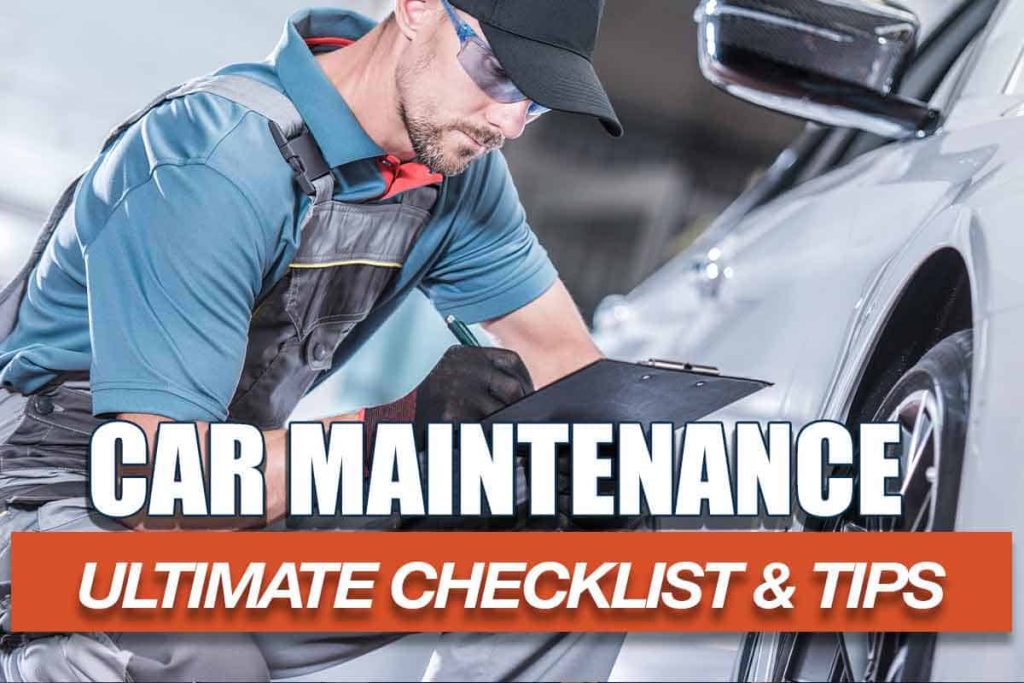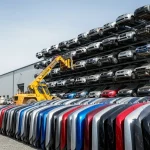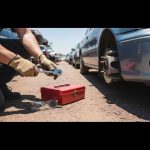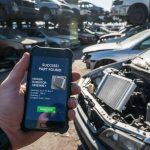As someone who has spent countless hours working on cars and helping others understand the importance of regular vehicle maintenance, I can’t stress enough how crucial it is to keep your car in top shape. Not only does it extend the lifespan of your vehicle, but it also ensures your safety on the road. In this guide, I’ll share with you a comprehensive car maintenance checklist and some valuable tips to keep your vehicle running smoothly.

The Importance of Regular Car Maintenance
Regular car maintenance is essential for several reasons. It extends your car’s lifespan, improves fuel efficiency, and reduces the risk of breakdowns. It can also help you avoid costly repairs in the future. By regularly checking your car’s essential components and performing necessary maintenance tasks, you can ensure that your vehicle remains reliable and safe to drive.
Your Ultimate Car Maintenance Checklist
Here’s a checklist of the essential car maintenance tasks that you should regularly perform:
- Check the Oil: Regularly checking and changing your car’s oil is crucial for its engine’s health. The engine’s moving parts need oil to prevent them from grinding against each other and causing damage. You can learn more about this in our video tutorials.
- Inspect the Tires: Tires are one of the most critical safety features of your car. Regularly inspect them for any signs of wear and tear and ensure they are properly inflated. If you need to replace your tires, check out our guide on where to buy used tires near me.
- Check the Brakes: Your car’s braking system is crucial for your safety. Regularly check the brake pads for wear and ensure the brake fluid is at the correct level.
- Inspect the Battery: A dead battery can leave you stranded. Regularly check your car’s battery for any signs of corrosion and ensure it’s fully charged.
- Check the Lights: Ensure all your car’s lights are working correctly, including the headlights, brake lights, turn signals, and reverse lights.
- Inspect the Belts and Hoses: Check the belts and hoses for any signs of wear or damage. If they are cracked or frayed, they need to be replaced.
- Check the Fluid Levels: Apart from oil, your car uses several other fluids, including coolant, brake fluid, power steering fluid, and windshield washer fluid. Regularly check these fluid levels and top them up if necessary.
Tips for Effective Vehicle Maintenance
Here are some tips to help you effectively maintain your vehicle:
- Follow Your Car’s Maintenance Schedule: Every car comes with a maintenance schedule from the manufacturer. This routine maintenance schedule outlines when different parts of your car need maintenance or replacement.
- Don’t Ignore Warning Lights: If a warning light illuminates on your car’s dashboard, don’t ignore it. It’s your car’s way of telling you that something is wrong.
- Keep Your Car Clean: Regularly cleaning your car canprevent rust and other damage. It also allows you to spot any potential issues early.
- Learn Basic Maintenance Skills: Learning basic car maintenance skills can save you a lot of money in the long run. You can learn how to change your car’s oil, replace the air filter, and even change a tire. Check out our video tutorials for some helpful guides.
- Know When to Seek Professional Help: While it’s beneficial to perform basic maintenance tasks yourself, some issues require the expertise of a professional. If you’re unsure about something, it’s better to seek help from a professional. You can find a list of reliable auto repair shops in our junkyard directory.

Service Rightaway
- Check engine light – If your car’s control system detects an issue, a warning light will illuminate in yellow. Don’t panic, but it’s best to take your vehicle to a repair shop as soon as possible. Avoid resetting the check engine light without understanding the underlying cause. A mechanic can perform diagnostic tests to identify the problem.
- Headlights/taillights – If a light goes out, it’s important to check for blown fuses. If that’s not the issue, replacing the light is necessary. It’s unsafe to drive with burned-out lights and can result in a traffic ticket.
- Tire pressure light – If the air pressure in a car’s tire drops below a certain amount, the tire pressure monitoring system (TPMS) will send an alert. It is important to maintain proper tire pressure to ensure safe driving conditions. Therefore, it is essential to inflate your tires to the recommended levels as soon as possible.
When is it recommended to schedule regular car inspections?
To ensure safe and reliable transportation, it is essential to read the manufacturer’s maintenance recommendations as stated in your vehicle’s owner’s manual. It is advisable to have your car inspected by a qualified mechanic at least once a year to detect any potential problems. Maintaining your car through preventative measures is crucial for every car owner. This way, you can take care of your vehicle and ensure its longevity.
Protect your investment and keep your vehicle in top condition with this guide to essential automotive maintenance tips.

Monthly Checkup.
- Turn signals, Fog lights, brake, and parking lights – It is quite noticeable when a headlight isn’t working, but other lights may not be as apparent. Therefore, it is recommended to conduct a monthly visual inspection of all the lights on the car by walking around it.
- Oil and coolant levels – It’s important to check the engine levels when it’s cool at least once a month. Additionally, it’s crucial to always top off the levels before embarking on a long trip.
- Tire pressure and tread depth – Prioritizing tire maintenance is absolutely crucial for a safe driving experience. It is imperative to frequently examine both the tires and spare for any signs of uneven wear, appropriate air pressure, and adequate tread depth. Remember to use a penny to check the tread depth – if Lincoln’s head is covered, there is still adequate tread left with more than 2/32″ of depth remaining.
- Windshield wiper fluid – Fill your wiper fluid reservoir to ensure a clear view while driving. A dirty windshield can be dangerous.
3-Month Checkup
- Oil and filters – For engines that use traditional motor oil, it is recommended to have an oil change every 3 months or after driving 3,000 miles. However, for engines that use synthetic oil, the interval between oil changes can be extended up to 10,000 miles.
- Battery and cables – Ensuring secure connections and absence of any corrosion or fluid leakage in both the battery and cables is crucial.
- Belts and hoses – Regularly checking the condition of the serpentine belt and other engine compartment belts is crucial. Any glazing, cracking, or fraying should be promptly addressed. In addition, it’s imperative to inspect hoses for leaks and take care of any cracks or bulges.
- Power steering fluid – It’s important to check the power steering fluid level once the engine has warmed up. If it’s low, be sure to add more fluid as needed to keep your vehicle running smoothly.
- Wiper blades – Maintaining good visibility while driving in the rain is crucial for safety. Worn wiper blades can compromise this, making it important to inspect them seasonally. If any damage is detected or if they no longer clear the windshield effectively, it’s time to replace them.
6-Month Checkup
- Rotate tires – To keep your tires in good condition and avoid noise and vibration problems, it’s recommended to rotate them regularly. However, it’s important to consult your owner’s manual beforehand as some tires and wheels may have specific rotation requirements or should not be rotated at all. Proper rotation can help balance tread wear and prolong the life of your tires.
- Wax vehicle – To safeguard your car’s exterior from rust, I recommend washing it on a regular basis and apply a wax coating at least twice a year.
- Exhaust system – It is highly recommended to thoroughly examine and repair any damage, especially if the muffler is making noise.
- Battery performance check – To ensure the proper functioning of your car, a good battery is essential. It is recommended to test the battery twice a year at your local auto parts store starting from when it turns three years old.
- Chassis lubrication – The manual provided by the owner should indicate whether the chassis, steering, and suspension systems need regular lubrication.
1-Year Check-up
- Air filters – Maintaining clean air inside your car is absolutely essential, and the cabin air filters are crucial to achieving this. It’s imperative that these filters be replaced annually to ensure optimal performance. Additionally, engine air filters serve to prevent debris from entering the engine, and it’s absolutely imperative that you have them inspected during oil changes so that your engine continues to run smoothly.
- Brakes – It’s really important to make sure that your brakes are working at their best, which means checking things like the brake fluid, brake linings, rotors, and brake pads. Just remember that how you drive can make a big difference in how long your brake pads last.
- Inspect shocks and struts – If you feel like your driving isn’t as smooth as it used to be, it’s a good idea to take your car to a trustworthy mechanic. The shocks and struts are really important for your car’s steering system, so it’s best to have them checked out by a skilled professional.
- Coolant/antifreeze – As per the manufacturer’s recommendation, it’s a good idea to replace the coolant and flush the entire cooling system once you’ve driven 60,000 miles.
2-Year Checkup
- Ignition system – It’s important to keep in mind that high-quality spark plugs, plug wires, coils, and other electrical components have the potential to last up to 100,000 miles. However, it’s highly recommended to perform periodic checks on the spark plugs starting at 30,000 miles, as symptoms like rough running or hard starting may indicate that they’re beginning to deteriorate.
- Transmission fluid – It is important to regularly check the transmission fluid levels and add more as necessary. Depending on the type of transmission, it is recommended to change the transmission fluid between 30,000 to 60,000 miles for manual transmission vehicles and between 30,000 to 100,000 miles for automatic transmission vehicles.
- Fuel filter – The guidelines provided by manufacturers for fuel filter replacement can differ, with some recommending replacement every 30,000 miles.
Long Lasting Maintenance
- Transfer case fluid –In a 4-wheel-drive or all-wheel-drive vehicle, the transfer case is responsible for shifting power from the transmission to the axles. To ensure optimal performance, it is recommended to have a professional check the transfer case fluid in accordance with the manufacturer’s recommendations.
- Front and rear differential – If you want your car to move forward, differentials are a must-have! These components distribute the engine’s torque to the tires, so it’s important to keep them lubricated and checked by a professional according to the manufacturer’s recommendations. Don’t forget to take care of your car’s differentials!
- Change tires – As a car owner, it’s important to keep an eye on the condition of your tires. Generally, tires can last anywhere from six to ten years. To ensure your safety on the road, make sure to check the tread depth regularly and ensure it’s greater than 2/32 of an inch.
- Battery – Check battery performance after 3 years, replace after 5 for best results.
- Timing belt – To determine the appropriate time to replace your timing belt, it’s recommended that you consult your car manual. Typically, this falls between 60,000 to 90,000 miles. It’s worth noting that some cars have timing chains that don’t require any maintenance or replacement unless an issue arises.
Follow your car manufacturer’s recommended service schedule for optimal performance and longevity. Leave any necessary repairs to qualified mechanics for the best possible care.
Frequently Asked Questions
How often should I service my car?
Regular servicing is crucial for maintaining your car’s health. As a general rule, you should service your car every 12,000 miles or every 12 months, whichever comes first. However, this can vary depending on your vehicle’s make and model.
What happens if I don’t service my car?
Neglecting regular service can lead to several problems, including reduced fuel efficiency, higher risk of breakdown, and potentially costly repairs in the future. It can also decrease your car’s lifespan.
What is included in a car service?
A typical car service includes an oil change, replacement of the oil filter, and a thorough inspection of the vehicle’s key components such as the engine, brakes, and tires.
How can I tell if my car needs a service?
Warning signs that your car may need service include strange noises, reduced performance, warning lights on the dashboard, and increased fuel consumption.
Can I service my car myself?
While you can perform basic maintenance tasks yourself, it’s recommended to have your car serviced by a professional to ensure all aspects are thoroughly checked and maintained.
What should I do if my car breaks down?
If your car breaks down, ensure your safety first by moving your car to a safe location if possible. Then, call for professional help. If your car needs replacement parts, you can check out our used auto parts store.
How often should I change my car’s oil?
It’s generally recommended to change your car’s oil every 3,000 to 5,000 miles, but this can vary depending on your vehicle’s make and model, and the type of oil you use.
How often should I check my car’s tire pressure?
You should check your car’s tire pressure at least once a month and before long trips. Proper tire pressure is crucial for your car’s handling, fuel efficiency, and the lifespan of the tires.
Remember, regular car maintenance is not just about keeping your car in good shape; it’s also about ensuring your safety on the road. If you need more tips or resources, feel free to explore our blog or visit our junkyard directory to find reliable auto parts and services near you.




